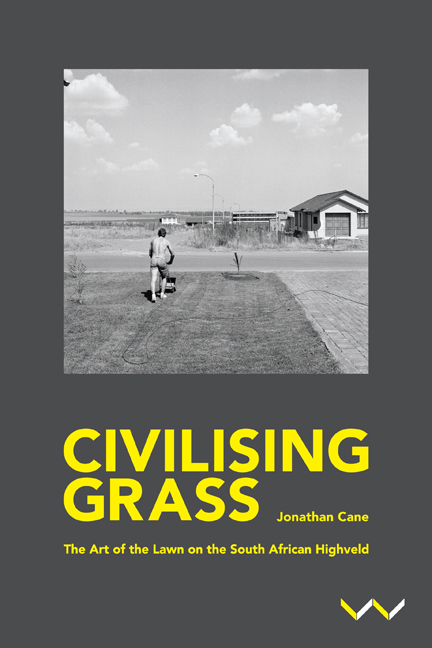2 - Keeping the Lawn
Published online by Cambridge University Press: 29 October 2019
Summary
and still we smile and
beg to mow your lawns
beg to clean your toilets
while you look past us
— Mike Alfred, Poetic LicenceThe domestic lawn is directly attached to or surrounding the house, it is privately owned, kept (well or badly) by someone, and is totally, partly, or not at all visible to the public. It always ends somewhere, bounded by a wall, a pavement, a fence, a hedge, a herbaceous border, in some more or less conscious relationship with adjacent lawns, veld, roads, parks and the larger landscape. Does the domestic really end at the kitchen door? Is the lawn simply a ‘view’ through the bedroom window, a backdrop to the battles within? The lawn is sometimes considered the outside of the house but, as I argue in this chapter, it can also be seen as fundamentally part of and within the domestic sphere.
In this chapter I aim to explain how the domestic lawn as a working landscape is implicated in issues of belonging, ownership, success and failure, gender and race. It describes the ‘garden boy’ via an analysis of various gardening texts, literary passages and historical records, and then locates the ‘boy’ in relation to the master/ madam/gardener. It also analyses white post-apartheid literary, artistic and archival representations of lawn mowing. Last, orientated around David Goldblatt's photograph Saturday Afternoon in Sunward Park. 1979, the chapter offers a critical reading of whiteness and respectability in relation to the lawn. The photographs informing this reading are related to geographical spaces – Boksburg, Orania, Epping Garden Village, Sasolburg and Zamdela.
Domesticating
Two ideas frame this chapter. The first is that lawn maintenance, keeping the lawn – the flurry of activity that includes mowing, fertilising, watering, composting, weeding and edging – is surely the most acute example of landscape as verb. Without effort, time, money, knowledge and equipment the lawn cannot grow. Work – paid or unpaid, fun or fearful, for leisure or labour – is the foundation of the lawn. It is also worth reflecting on the synecdochical quality of mowing, the way in which lawn mowing tends to end up standing for lawn keeping in general.
- Type
- Chapter
- Information
- Civilising GrassThe Art of the Lawn on the South African Highveld, pp. 47 - 90Publisher: Wits University PressPrint publication year: 2019



